#free ttrpg resources
Explore tagged Tumblr posts
Text
What to Play Next with Eureka.
So, now that the pay-what-you-want/free Eureka: Investigative Urban Fantasy beta has over 400 downloads at the time of writing this (wow!) and has been up for about 3 weeks, I’m sure at least some people have already played Horror Harry’s Haunted House, the free tutorial adventure module we included with the beta download, and are excited to play more!
To that end, I’ve quickly thrown together a non-comprehensive list of adventure modules to run using Eureka, and where you can find them.
Adventure modules, if you’ve never used them, are a lifesaver for GMs. (And also they’re a different thing from those railroady “adventure paths” and crappy 5e adventures that you might be familiar with.)
Official Eureka Adventures
You can find official Eureka: Investigative Urban Fantasy adventure modules on our Patreon page. Supporting us is what makes Eureka, and our ongoing promotion of many other TTRPG creators, possible.
Horror Harry’s Haunted House
This is an official Eureka adventure module that comes free with the beta linked above. It is a super low-stakes “tutorial” adventure that sees the PCs solving a “murder” in an interactive escape room. The point of this scenario is to be a short and fun way for players to learn the mechanics of Eureka: Investigative Urban Fantasy without risk of their characters dying.
FORIVA: The Angel Game
This is an official Eureka adventure module by A.N.I.M. currently available only to patreon subscribers. Set in the year 1999, this adventure involves the PCs investigating a mysterious threat targeting teenagers.
The Eye of Neptune
This is an official Eureka adventure module by A.N.I.M. currently available only to patreon subscribers. Set on a skeleton-crewed oil rig in the height of the Covid-19 pandemic, this adventure puts the PCs in a tense situation as members of the crew start to disappear one by one...
Free Call of Cthulhu Adventures
Since we have not had the time (yet) to build up a robust library of official Eureka adventure modules, Eureka: Investigative Urban Fantasy has been playtested the most by using Call of Cthulhu adventure modules, and it is designed to work well with them. In fact, in many cases it actually plays them better and smoother than Call of Cthulhu itself!
Chapter 7 of the Eureka rulebook covers how to convert an adventure module from another game for use with Eureka, and its super easy! The only thing that will need to be adjusted will be the HP values of monsters and we have a formulae for that.
What's In The Cellar, a super short adventure where the PCs will investigate a mysterious cellar.
Scritch Scratch, there's rats.
The Derelict, set in the modern-day in the icy waters of the North Atlantic, the thought of a substantial salvage reward drives the investigators to attempt to rescue the a stranded ship, but in doing so they attract the attention of a strange and deadly monster.
The Lightless Beacon, the ivestigators are unfortunate passengers on a ship heading for Rockport, Massachusetts, on Monday, April 12th, 1926, the night of the new moon. Due to a malfunction at the lighthouse on Beacon Island, their ship founders on nearby rocks, forcing the investigators to take to a small lifeboat and head to Beacon Island for refuge in the growing storm.
Dead Boarder, a murder investigation, which centers on the discovery of a body in a locked room.
Paid Call of Cthulhu Adventure Modules
Even though they aren’t exactly “indie,” just about any non-WotC company that makes TTRPGs is an ally against the monopoly crushing the entire hobby and art form of TTRPGs, so we would love it if you could support them as well as supporting us. Eureka: Investigative Urban Fantasy wouldn’t exist without Call of Cthulhu, and especially not without Call of Cthulhu adventure modules! In fact they’re like one of the only “big” names out there that still regularly puts out adventure modules, which seem to be a lost artform seemingly everywhere else despite once being being absolutely synonymous with GMing. They’ve been making new official Call of Cthulhu adventure modules consistently for like forty years, and buying and playing these will encourage them to keep doing that.
New Tales of the Miskatonic Valley (pack of adventures)
The Reeling Midnight, by Tom Lynch. introduces Investigators to Arkham's truly decadent party scene. (I've played this one, pretty good.)
Wasted Youth, by Christopher Smith Adair, explores the roots of juvenile delinquency, culminating in a wild chase through the wilderness.
Spirit of Industry,by Oscar Rios, takes Investigators to the village of Dunwich, where they explore old murders and an ancient mystery.
Proof of Life,by Keith Herber, is a tale of extortion and madness in the Lovecraft Country town of Foxfield.
Malice Everlasting,by Oscar Rios, expores Kingsport and old grudges.
The Night War,by Kevin Ross, sees the author of Kingsport, City in the Mists, revisit his creation when a veteran of the Great War is suddenly haunted by deadly nightmares.
A Mother's Love, by Seth Skorkowsky, author of the Valducan series, takes us to the hidden town Innsmouth, with all its squalor, dangers, and dark corruption in a brand new scenario for New Tales of the Miskatonic Valley, 2nd Edition. (I've played this one, pretty good.)
The Things We Leave Behind (pack of adventures)
Ladybug, Ladybug, Fly Away Home, by Jeff Moeller. The investigators search for an abducted child in suburban Cleveland, Ohio, where time becomes a serious concern.
Forget Me Not, by Brian M. Sammons. An accident in a TV truck in rural Michigan sees the investigators awake in a ditch with no recollection of how they got there.
Roots, by Simon Brake. Inquiries into a missing teen will teach the investigators that some mid-west communities prefer to be left alone.
Hell in Texas, by Scott Dorward. After a suicide at a church's east Texas Halloween haunted house, strange events threaten the lives and sanity of all those in the vicinity, including the investigators.
The Night Season, by Jeff Moeller, shows that fandom in Anchorage, Alaska, can go too far when reality begins to shift.
Occam's Razor (pack of adventures)
A Whole Pack of Trouble - a group of film students have gone missing while shooting a found-footage style movie over college break.
Eye of the Beholder - five days ago, a young woman disappeared while working on an art project.
Frozen Footsteps - A Wendigo-obsessed professor heads off to Michigan's Upper Peninsula for some rare (for him) fieldwork and discovers far more than he bargained for.
Dark and Deep - A snuff film is making the rounds in which a woman is mauled to death by a Deep One. Are the film's establishing shots enough to track down the lighthouse was filmed at and get to the bottom of things?
Visions from Beyond - A late-night voicemail left by a friend/relative in need of immediate help followed by them not answering their phone
The Watchers - the investigators are contacted by a single woman who lives alone and is being watched by unknown people.
A Cleansing Flame - Bodies are being discovered, burned to death, with no known fire starter/accelerant present.
Does Love Forgive? (pack of single-PC adventures)
Love You To Death, Chicago: February 15th, 1929. It’s a cold winter’s day when the investigator’s good friend Hattie May appears in their office at the detective agency. Her beloved pet dog, Highball, is scheduled to be destroyed later today and she needs the investigator’s help getting him back from the Chicago Police Department. It doesn’t sound like too difficult a task, does it?
Mask of Desire, New York: September, 1932. The investigator, together with their two close friends Anna Konrad and Lucas Reston, has been invited to a party at wealthy—and notorious—socialite Madame de Tisson’s swanky apartment on the Upper West Side. Anna is somewhat distracted by her audition tomorrow for Nancy Turner, the famous jazz orchestra conductor. What is the link between the audition and a mysterious parcel that arrives the next day? And, why do so many people seem to be interested in the contents of the parcel?
Night Mother's Moon (stand-alone adventure), investigators are New York City’s street homeless who come together to solve the mystery of something that is stalking and killing the members of their community. (Playing this one with Eureka right now actually.)
#call of cthulhu#lovecraft#ttrpgs#ttrpg#ttrpg tumblr#ttrpg community#indie ttrpg#free rpg#free ttrpg resources#free ttrpg#free ttrpgs#cthulhu#cosmic horror#call of cthulhu ttrpg#lovecraftian#eldrich horror#eldritch#queer art#queer rpg#queer artist#eureka#eureka: investigative urban fantasy#rpg#tabletop#roleplaying
249 notes
·
View notes
Text
VAST Guides are here!
By using VAST, you can learn how to add accessibility tags for screen readers to your PDFs, by using Adobe InDesign and Adobe Acrobat.
I'm super excited to release a brand new publishing community resource: VAST (or Visual Accessibility Skills Toolkit).
>> WWW.VAST.GUIDE <<
VAST is a collection of short articles aiming to spread awareness about what visual impairments are, and how folks in the small press industry can accommodate them.
The guides are split into four sections:
Visual Impairment 101 explores what visual impairments are, how visually impaired people navigate digital content, and introduces some current language and definitions (circa 2023).
Screen reading PDFs explores the basics of how screen readers navigate through digital content. Includes video examples!
Using InDesign introduces different tools that designers can use to make their documents more accessible.
Putting Into Practice presents case studies of common structures in roleplaying games, and how they could be given accessibility tags using tools covered in section 3. (Coming soon!)
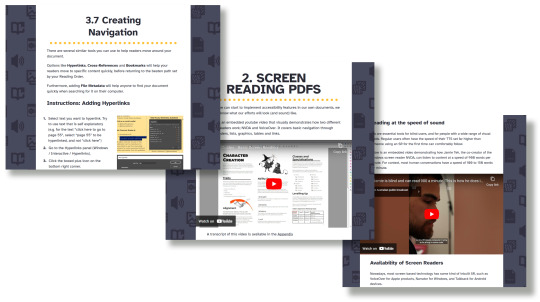
VAST was developed by Brian Tyrrell (me!), and disability advocate and accessibility consultant Yubi Coates. Visually impaired consultants and InDesign experts were brought in to corroborate the guides.
All of the information in the guides is up to date, and we’re committed to reviewing and updating the guides in 2024 and 2025.
This project was completed using a small pot of funding provided by Creative Scotland’s Create: Inclusion program in 2022.
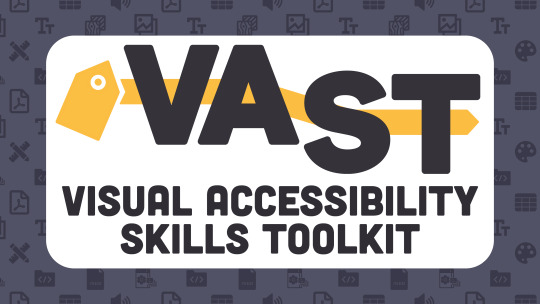
#ttrpg design#indie ttrpg#tabletop rpg#publishing#visual accessibility#screen reader#visually impaired#blindness#accessibility#pdf#indesign#acrobat#adobe#free resources#I always get anxious when releasing stuff#brb going to sit in a corner now#hope you like it!
530 notes
·
View notes
Text
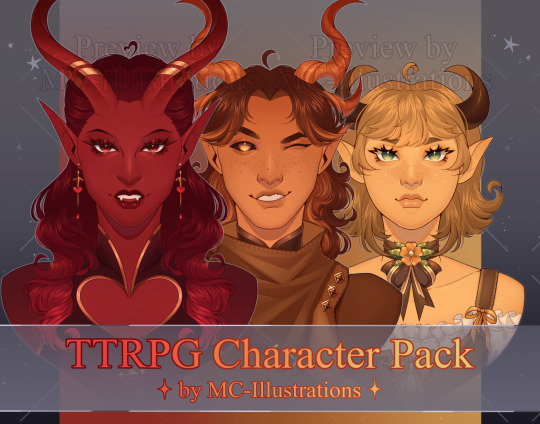
✨ Free TTRPG Character Portraits ✨
A set of tieflings ready to inspire your next PC or NPC! You can download them for free here☕
#digital art#art#dnd art#dnd character#dnd#character art#ttrpg#ttrpg resources#character portrait#tiefling#artists on tumblr#character design#digital illustration#digital aritst#my art#ttrpg character art#*throws them out into the void of the internet* be free ✨
32 notes
·
View notes
Text
o I stuck my cheatsheet for Pathfinder 2e actions up on my itch btw
if you want it formatted for printing as a lil booklet that is there too!

#I uhh... almost had a money oopsie this morning#so like IF YOU WANTED...#but the pdf is free cause bruh its a pdf#also I've been meaning to upload that to itch since I made it#pathfinder#pathfinder 2e#ttrpg resource
12 notes
·
View notes
Photo

Free Resource Downloadable
The Further Reading Section of "Operation Lavender," a trans-focused adventure for Trinity Continuum: Aberrant set in the Southern US and written by a Southern trans guy, is up on my Patreon for all members. https://www.patreon.com/posts/operation-108488268
#artists of tumblr#ttrpg#ttrpg community#writing#ttrpg development#patreon#trans#trans artist#trans in the south#disabled artist#trans writer#disabled writer#my art#trinity continuum#aberrant#trinity continuum aberrant#free stuff#resources#charities#queer history#queer education#queer#ttrpg safety tools#antifascism
3 notes
·
View notes
Text
I moved away from D&D personally, but with everything going on with WotC, sharing this information I feel is very needed. Enjoy the resources for anyone looking into TTRPGs (for those interested in other systems, I recommend checking out r/rpg on Reddit; not everyone will care for D&D or Pathfinder, so that thread will help you find the system that works best for you and your group)

I might've added the BG3 Art Book to my dnd assets stash
It's got stuff like the 5e players' handbook + 5e’s character sheet, the dm's guide, critical role's explorer's guide to wildmount, baldur's gate and waterdeep city encounters, 101 potions and their effects, volo's guide to monsters, both of Xanathar's guides, a bunch of other encounters, one shots, class builds, and other fun stuff!!
90K notes
·
View notes
Text
Volunteering, Virtual Dash, and Various Other Happenings!
Hey y’all!
Buckle up, we’ve got a bit of everything in this one.
Volunteer Applications!

We’re excited to say that volunteer applications for DashCon 2 are now open! You can apply to our form here (https://forms.gle/aaBjd9eSGZBsARBE7), or find out more on our website (https://www.dashcontwo.com/volunteering/). Our convention relies on volunteer staff to keep everything running smoothly, and there’s plenty of work to go around. We’re really glad to have received interest from so many of y’all, so applications will be open until we’ve filled all of our positions.
All regular volunteers will be assigned to at least one 4-hour shift between 7 AM and 11:30 PM on July 5th, 2025. Volunteers who complete their shift, or otherwise work 4 or more hours, will get free access to the con for the rest of the day.
Successful applicants will be required to sign a waiver to volunteer for the convention. Applicants who are under 18 years old must have a parent or guardian sign their waiver.
What about Virtual DashCon?
We appreciate all of the feedback we got after our announcement post last week! We’re happy to say that we’re going ahead with our plans for a virtual convention! However, considering how many of you were enthusiastic about the concept of virtual dash, we’d like to address a common question!
Why would a virtual con cost money? Because it costs money to run! We’re partnering with Live Media to ensure that the live-streamed panels, pit, and duel will run smoothly. We want to make our convention as accessible as possible, we’ve received hundreds of messages from people who couldn’t get a ticket, but we just don’t have the resources or expertise to run a virtual event with volunteers alone. Even with a professional live-streaming team, we’ll need to organize moderators for the official server, vet digital panellists, and all the other administrative work that comes with a virtual event. DashCon 2 is going down in history one way or another, but we’ll be damned if we don’t get good footage for the next generation of documentarians.
We’ll also donate 15% of every ticket to the Canadian Cancer Society! That’s 15% of the total price of the tickets, not the profits. You can learn more about our fundraiser here, and donate directly to our campaign on the Canadian Cancer Society’s website.
Drag at DashCon 2!
DashCon 2 is excited to announce that we’ll be featuring a spectacular showcase of talented drag performers! Performers will be lipsyncing, dancing, and generally serving, to the tune of such classics as How Bad Can I Be? We’re happy to say that we have two confirmed drag artists: Heaven/Hellish Lee (@heaven_lee_court.hellish_lee) and Pandora’s Box Muncher (@pandorasboxmuncher), both on Instagram! They are both incredibly talented - please check out their work and give them some love :)
We hope to announce a few additional performers before the day of the con, so stay tuned!
If you’re an interested local performer: please feel free to reach out to us directly at [email protected] with a link to your website/social(s), a few example photos, and what sort of performance you’d like to give. Portfolios may contain 18+ content, but performances at DashCon 2 must be appropriate for ages 13+.
LVLUP Board Game Room
We’re happy to remind you all that DashCon 2 will have a board game room, kindly sponsored by LVLUP Games! A quick FYI: while they will be providing board games of all sorts, they will not be providing TTRPG materials, dice, or DMs, so you’ll have to BYOD (Bring Your Own Dice). There must be at least a few dice goblins in our audience who have collections to show off.
As always, you can find more information on our website or follow us on Substack!
435 notes
·
View notes
Note
Do you have any suggestions for system-agnostic modules that work well for Eureka's urban horror-fantasy vibe? I saw that there's some publisher suggestions in the free rulebook, but I thought I'd ask if you all have any favorites!
We actually have a post just for this!
#ttrpg#indie ttrpgs#ttrpgs#ttrpg design#ttrpg tumblr#indie ttrpg#ttrpg community#free rpg#rpgs#fantasy rpg#rpg#supernatural rpg#rpg ressources#ttrpg resources#free ttrpg resources#noir#horror#lovecraftian horror#lovecraft#lovecrafian#eureka#eureka: investigative urban fantasy
97 notes
·
View notes
Text

With our Crips for Esims for Gaza Itch Bundle halfway to the $100,000 goal, let's take a minute to actually spotlight some of the works in it! A lot of stuff was specifically created or submitted for our cause, and are not only entertaining, but are great resources for getting yourself involved!
Let's check some of these projects out!

What Palestinians’ Use of eSIMs Can Teach Us About Tech
A fantastic introduction essay written by friend of the group, @chloetankahhui.bsky.social, specifically for our bundle! I highly suggest it as your first download after purchase!

What Is An eSim?
Another project designed to quickly inform people on how eSims are used in Gaza! Made by various volunteers in our own Crips for eSims group. We hope to use this as an easy printable way to spread the word of what we do!

Cartoonists for Palestine anthology
250 whooping pages of incredible art! It is worth spending an evening looking through all 63 stories! Thank you to @redgoldsparks for submitting this collection!

a fruit is a stone
A chapbook made by one of our volunteers, who also apparently studies rocks on Mars! Go ahead and take a minute to read some poetry about sediment.

Game Assist for Palestine Companion Zine
If you love video essays about video games, especially breaking down the politics in them, then grab yourself the companion zine for some of Game Assist's videos!

In Fear of Fucking It Up
In Fear of Fucking It Up is a zine collecting scraps of essays focused on the authors personal thoughts; all themed on the intersectionality of the Palestinian and African American struggle, the overwhelming pressure to perform socially, and general thoughts about acts of resistance. A neat little zine with a very personal perspective!
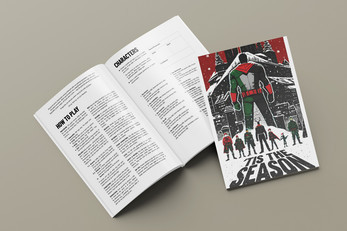
'Tis the Season
Have you ever wanted to be a mistletoe themed superhero? Check out this TTRPG to get involved with domestic actions from protecting protestors to destroying arms shipments!

ANY SAND
May be a little biased, since hexcavator is one of the wonderful authors of our bundle, but Any Sand is a beautifully crafted point and click game with themes of resistance similar to the Rasha Abdulhadi poem it is named after.

Drawings for Palestine
Now it's time for some free poster assets! This bundle by Axell is planned to be updated over time; with all works in the public domain!
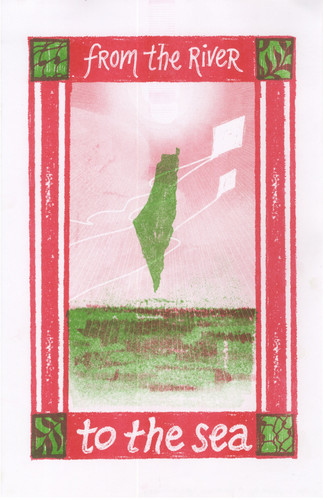
RISO PRINT FILES FOR PALESTINE
I'm not entirely sure what a risograph print is, but these also have inkjet and laser printer file formats available! The concept of scanning in your own keffiyeh for the red layer is a brilliant way to make your own print run unique!

MASK UP! Poster print pack
Plenty of color options available for your needs! Gosh this poster is just so cool. Thanks @counterintuitivecomics for submitting it along with a really cool guide for navigating Covid-19!

Esims for Gaza Poster Graphics
Ending on my own art hahaha! I've been doing what little I can to make poster graphics for our cause since July of 2024. I never would have expected them to end up wheatpasted around Canada! I'll also be updating this pack with new assets or updated information when I can. Use these graphics and characters however you like, just be sure to send me pictures!

And that ends our round up of Palestine themed projects! This should be plenty to keep you busy for a few evenings, but that's only some of the over 200 projects submitted to our bundle! There's plenty more hidden treasure in there, but that may be for another day. This post is already getting to "color of the sky" length anyways.
But hey hey, did YOU read a zine or game in this bundle that you really enjoyed, and you think people should check out? Let folks know! And let them know that our bundle is still going until the end of May 19th!
At the time of this post, we are already halfway to our new goal of 100k! Let's get it up there!
370 notes
·
View notes
Text
This looks super useful
So many “how to find free/budget TTRPG art” guides are just like “Pixabay exists” and that’s it. Even with the resources, it’s difficult to actually find usable art, especially if you’re looking for illustrations and not photos, and ESPECIALLY now that you have to wade through AI stuff on a lot of these websites
2K notes
·
View notes
Text
announcing spiritkeep: a therapeutic ttrpg
howdy all! some big announcements!!!
first, im nearing the end of my master's program, studying rhetoric and writing, games, and educational psychology. im about halfway done with my thesis, and figured it was time to make an announcement …
my thesis, entitled "designing spiritkeep: therapeutically applied RPGs as a discourse community" is … about what it says on the tin :) in it, I look at the practice of TA-RPGs, which are TTRPGs run for the express purpose of inducing therapeutic growth. TA-RPGs are usually run by a clinician, like a therapist or counselor, or a certified therapeutic game master. my thesis is looking at the needs of therapeutic game masters as a community and asking … what do they need from TTRPGs that isn't currently available?
the thesis takes concepts from rhetoric, linguistics, game studies, literature studies, psychology, and more to ask the question … what would a TTRPG specifically designed for therapeutic use look like? i examine concepts like bleed, close to home characters, dramatic rehearsal, performative speech acts, fixed vs growth mindsets, information processing theory, and more. i also look at criteria set forth by current TA-RPG practitioners for what makes a good TA-RPG, and examine five current games against those criteria. then, i put together the research into a foundation for spiritkeep, a dedicated TA-RPG

spiritkeep is designed around the goal of helping teens and adults heal from complex trauma
that said, its perfectly suitable for a homegame as well, as long as everyone is on the same page and approaches it with the mindset of collaborative growth. all in all, it's still going to be a fun game and a good TTRPG!!
in spiritkeep, you play as a smalltown taskforce with the shared goal of restoring your currently struggling community to a thriving state. you go out on missions like finding resources, diplomacy with neighboring cities, researching ecological problems, and more, while you slowly make your town a better place to live. spiritkeep includes collaborative worldbuilding, a large assortment of playbook options like the Wayfarer, the Knight, the Ghost, or the Shepherd (all designed to hit where it hurts, at least a little!), and a brand new system inspired by PBtA, FitD, BOB, WoD, and more. while the game is designed around grappling with identity and learning how to grow, it can also get a bit tactical and crunchy!! the new dice mechanic makes you think on your feet with every roll
this announcement is also to say that i am beginning the initial crowdfunding of the game through itch. right now, im trying to raise funds to pay the fee to my school to make my thesis open access, meaning anyone can read it. then, remaining funds will go towards things like resources, consultants, art for the kickstarter, and everything else i need to get this project off the ground. ideally, ill be able to team with a publisher to cover the logistics of business while i can focus on the game itself. once the game is finished, there will still be plenty of playtesting, consulting, and other work to do. but!!! this post marks my first steps towards what has been my dream for years now
this sale is how im starting the funding process. it includes the zine preview of my thesis, covering my chapter outline and big concepts, and also my first TA-RPG: with breath & sword, a solo game to help players calm down from anxiety. both items have community copies available: please feel free to grab one if you can't contribute !!
questions, comments, or partnership offers can be sent to psychhoundgames @ gmail(.)com
thanks y'all!!! wish me luck!!!! 🥰🥰🥰
#indie ttrpgs#ttrpg community#itch sale#therapy#mental health#actually autistic#actually mentally ill#trauma recovery#spiritkeep tarpg#spiritkeep ttrpg#spiritkeep
324 notes
·
View notes
Text
So, you want to make a TTRPG…

Image from Pexels.
I made a post a long while back about what advice you would give to new designers. My opinions have changed somewhat on what I think beginners should start with (I originally talked about probability) but I thought it might be useful to provide some resources for designers, new and established, that I've come across or been told about. Any additions to these in reblogs are much appreciated!
This is going to be a long post, so I'll continue beneath the cut.
SRDs
So, you have an idea for a type of game you want to play, and you've decided you want to make it yourself. Fantastic! The problem is, you're not sure where to start. That's where System Reference Documents (SRDs) can come in handy. There are a lot of games out there, and a lot of mechanical systems designed for those games. Using one of these as a basis can massively accelerate and smooth the process of designing your game. I came across a database of a bunch of SRDs (including the licenses you should adhere to when using them) a while back, I think from someone mentioning it on Tumblr or Discord.
SRDs Database
Probability
So, you have a basic system but want to tweak it to work better with the vision you have for the game. If you're using dice, this is where you might want to consider probability. Not every game needs this step, but it's worth checking that the numbers tell the story you're trying to tell with your game. For this, I'll link the site I did in that first post, AnyDice. It allows you to do a lot of mathematical calculations using dice, and see the probability distribution that results for each. There's documentation that explains how to use it, though it does take practice.
AnyDice
Playtesting
So you've written the rules of your game and want to playtest it but can't convince any of your friends to give it a try. Enter Quest Check. Quest Check is a website created by Trekiros for connecting potential playtesters to designers. I can't speak to how effective it is (I've yet to use it myself) but it's great that a resource like it exists. There's a video he made about the site, and the site can be found here:
Quest Check
Graphic Design and Art
Game is written and tested? You can publish it as-is, or you can make it look cool with graphics and design. This is by no means an essential step, but is useful if you want to get eyes on it. I've got a few links for this. First off, design principles:
Design Cheatsheet
Secondly, art. I would encourage budding designers to avoid AI imagery. You'll be surprised how good you can make your game look with only shapes and lines, even if you aren't confident in your own artistic ability. As another option, public domain art is plentiful, and is fairly easy to find! I've compiled a few links to compilations of public domain art sources here (be sure to check the filters to ensure it's public domain):
Public Domain Sources 1
Public Domain Sources 2
You can also make use of free stock image sites like Pexels or Pixabay (Pixabay can filter by vector graphics, but has recently become much more clogged with AI imagery, though you can filter out most of it, providing it's tagged correctly).
Pexels
Pixabay
Fonts
Turns out I've collected a lot of resources. When publishing, it's important to bear in mind what you use has to be licensed for commercial use if you plan to sell your game. One place this can slip through is fonts. Enter, my saviour (and eternal time sink), Google Fonts. The Open Font License (OFL) has minimal restrictions for what you can do with it, and most fonts here are available under it:
Google Fonts
Publishing
So, game is designed, written, and formatted. Publishing time! There are two places that I go to to publish my work: itch.io and DriveThruRPG. For beginners I would recommend itch - there's less hoops to jump through and you take a much better cut of what you sell your games for, but DriveThruRPG has its own merits (@theresattrpgforthat made great posts here and here for discovering games on each). Itch in particular has regular game jams to take part in to inspire new games. I'll link both sites:
itch.io
DriveThruRPG
Finally, a bunch of other links I wasn't sure where to put, along with a very brief summary of what they are.
Affinity Suite, the programs I use for all my layout and designing. Has an up-front cost to buy but no subscriptions, and has a month-long free trial for each.
Affinity Suite
A database of designers to be inspired by or work with. Bear in mind that people should be paid for their work and their time should be respected.
Designer Directory
An absolute behemoth list of resources for TTRPG creators:
Massive Resources List
A site to make mockups of products, should you decide to go that route:
Mockup Selection
A guide to making published documents accessible to those with visual impairments:
Visual Impairment Guidelines
A post from @theresattrpgforthat about newsletters:
Newsletter Post
Rascal News, a great place to hear about what's going on in the wider TTRPG world:
Rascal News
Lastly, two UK-specific links for those based here, like me:
A list of conventions in the UK & Ireland:
Convention List
A link to the UK Tabletop Industry Network (@uktabletopindustrynetwork) Discord where you can chat with fellow UK-based designers:
TIN Discord
That's all I've got! Feel free to reblog if you have more stuff people might find useful (I almost certainly will be)!
468 notes
·
View notes
Note
hi so ive been interested in designing my own ttrpg lately, and a big part of that is simply becoming familiar with extant ttrpgs and their genres. so i come to you to ask for good introductions (not necessarily to play, but to read) to the dungeon crawling genre. like, ones which sort of make clear what exactly dungeon crawling is, and what the appeal of it is.
Ok well! This is an interesting ask!
Before I make any recommendation, I'll just say that in my personal opinion, a good dungeon-crawler includes all or most of the following elements:
Emphasis on resource management, the PCs' resources should be always dwindling in a way that makes the choice to retreat vs. push forward a meaningful one
Emphasis on attention to detail and environment interaction, as well as resourceful and creative usage of the tools at the PCs' disposal to overcome challenges with no predefined solution.
Mechanics that disincentive combat as the default outcome of every encounter (such as high lethality, no guarantee of "balanced" encounters, significant time and/or resource investment required to recover from damage taken during a fight, etc.) The decision to engage in combat should not be the default assumption whenever a creature is encountered, it should be one that always carries significant risks and potential consequences, ideally incentivizing players to find creative or resourceful ways to bypass combat situations through stealth, deception, parlay, fleeing, etc., and only engage in it when they think exposing themselves to those consequences is justified or the only option (or when they've found an ingenious way to tip the scales in their favor).
A reward structure that encourages players to explore and interact with the environment, such as the classic Gold For XP rule that encourages players to search every nook and cranny for any bit of hidden treasure.
Systems that encourage an open-ended structure with no pre-defined GM-authored narrative.
That's just my opinion though. I think that a bit essential reading for your purposes would be any of the D&D editions from when the main focus of the game was still dungeon-crawling rather than grand epic high fantasy adventures. I recommend reading the Basic booklet from the 1981 Basic/Expert set, which is probably the D&D edition that has had the most explicit influence over the modern dungeon-crawling revival (B/X retroclones are basically their own entire subgenre of the OSR). Old-school D&D is just a good starting point to understand a lot of the basic elements and base assumptions that later dungeon-crawlers are, in some way or another, in conversation with. But like. D&D's legacy looms so large here that this recommendation was probably already a given.
While it isn't a game, but rather a primer formatted as a collection of Player and GM principles, I would also say that the Principia Apocrypha is also pretty much required reading, as it's IMO the clearest distillation of the play culture that modern OSR and OSR-adjacent dungeon-crawlers are try to incentivize.
I think it's also an example of something I find interesting about the OSR and its associated play culture: as @thydungeongal (I think it was her, at least) put it once, as much as the OSR community claims to be getting back to the roots of the hobby, much of its play culture is actually an exercise in historical revisionism. The play culture espoused by the OSR community isn't really a faithful recreation of the play culture that actually existed around dungeon games back in the day, but more like. an attempt to reverse-engineer a play culture that's actually compatible with the mechanics and assumptions of old-school dungeon games. And I think the Principia Apocrypha is a wonderful and clear distillation of this reverse-engineered play culture.
As for my actual recommendations now:
Mausritter by Isaac Williams, I know I'm always recommending Mausritter every time I get the chance but like. I don't only recommend it because it's my favorite game, but because it's extremely approachable regardless of your previous level of familiarity with tabletop rpgs (probably one of the best possible introductory games to the hobby) AND it does a lot of stuff that is relevant here.
First of all, despite the fact that it doesn't explicitly refer to its adventure locations as "dungeons" or use the term "dungeon-crawling" or related, it *is* very much a dungeon game, and explicitly spells out the gameplay loop and setting assumptions of dungeon games: the world is dangerous, settlements are small, rare, and usually their stability is threatened in some way, and you play as one of the few people who are willing to brave the dangerous outside world to find riches to bring back to the safety of a settlement (it's trivially easy to point out the ways in which this setup has the potential for a lot of #unsavory ideological implications, but it *is* the standar dungeon game setup and it *does* make for a compelling gameplay loop). It also explicitly spells out a lot of the principles that support my ideas for what makes a good dungeon crawler. For example, I like how it explicitly encourages players to be resourceful by straight-up telling them that relying on dice-rolls is dangerous, that dice rolls can be avoided with preparation and resourcefulness, as actions that you attempt with a good plan or the right tools automatically succeed without a roll, and thus the most optimal way to play is one where you minimize or completely eliminate the necessity to roll dice through clever planning and use of the tools at your disposal.
I also really like how it leans into the resource management aspect by tying so many of its mechanics to inventory management. Like. Its cars-based physical inventory is cute and distinctive and intuitive:
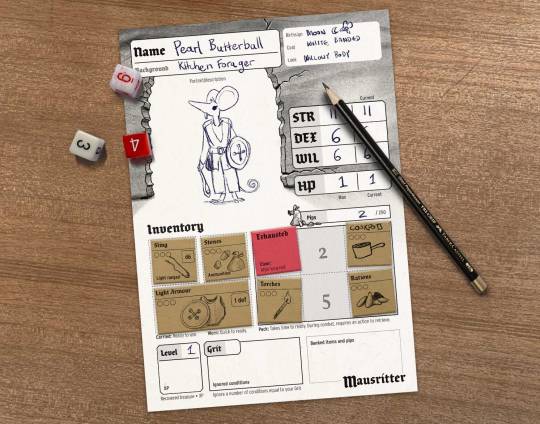
But it also clearly has to exist because shuffling items around in your inventory is such a load-bearing mechanic for many of its systems. Like, inventory is extremely limited (you have two paw slots, two body slots, and six slots in your backpack, that's all the items you can carry, and being completely encumbered gives you disadvantage on every roll), which of course limits the tools and resources you can bring into a dungeon, but also:
The only source of XP in the game is treasure: the XP you get is equal to the value in pips (the mouse kingdoms' standard currency) of any treasure that you bring back from a dungeon to a settlement. This means you need to balance making sure you bring any gear you'll need with making sure you leave yourself enough free inventory space to be able to carry any treasure you find.
Negative conditions take up an inventory slot each, which makes them especially dangerous and hard to ignore, as getting hit with a negative condition might mean having to leave some of your items or treasure behind.
Spells are physical items in your inventory, and you need to be holding them in your paw in order to cast them. This means that not only the space you dedicate to spells in your inventory is an important choice, but also WHERE you put them in your inventory (items in your body slots are assumed to be strapped to your upper body and may be freely swapped to your hands at any point, but items in your pack slots require an action to retrieve).
A common argument against the kind of resource management centered in this type of dungeon-crawling gameplay is that inventory management is boring and tedious, but Mausritter shows how much well-exevuted inventory management adds to this gameplay style. It not only makes keeping track of inventory fun and effortless, but also explicitly turns it into an extremely engaging source of tension and challenge by tying it to as many of its systems as possible.
There's a lot else I could say about Mausritter (like how much I like its damage system, which is very effective at having longer-term consequences for getting hurt in co.bat beyond HP loss without being too very punishing, how much I like the faction system, how good its GM toolkit is, etc.) but let's move on.
Dungeon Crawl Classics by Goodman Games is a game I kinda slept on for a long while, because as far as I knew it was mostly an AD&D clone with an admittedly cool artste that evokes the more pulpy illustrations of 80's D&D with a bit of a grimier feel to it. But after checking it out, it's a very unique game that leans very hard on the strange, chaotic, pulpy gonzo side of dungeon-crawling. The most distinctive feature of DCC is its heavy use of an absurd amount of random tables. While this can be a bit cumbersome to be quite honest, the randomness inherent to the system and the sheer number of strange and absurd table results do a phenomenal job of Putting The PCs in A Situation™ in a way that requires them to be constantly on their toes. It's just a lot of (extremely chaotic, extremely lethal) fun, as the players can never know what to expect and they can easily be thrown into disarray at a moment's notice and have to think on their feet. Definitely not for everyone but it's very interesting nonetheless.
DCC is also responsible for creating the concept of the level 0 funnel adventure (or at the very least popularizing, not sure if any other game did it before but DCC definitely was the game that brought attention to it): the game starts with a big group of level 0 characters, with the understanding that their first adventure will serve as a meatgrinder in which most of them will inevitably die (which is why each player starts off controlling up to 4 characters). Only the ones that survive their first adventure get to advance to level 1 and pick a character class to become full-fledged adventurers. Starting off controlling several characters with the assumption that most of them will not survive long into their first adventure is an extremely heavy-handed but very effective way of establishing the tone of high lethality I mentioned before, which is an essential tool for forcing players to find ways to deal with encounters other than immediately charging into combat.
Knave 2e by Ben Milton is a pretty solid D&D-adjacent dungeon crawler with enough cool features to mechanically stand apart as its own thing (such as the fact that the system is designed to effortlessly convert any GM-facing roll into a player-facing roll if desired, and some relatively unique character generation procedures) while still preserving compatibility with most D&D adventures, which is really cool. It has very clear and streamlined procedures for dungeon and wilderness exploration, it makes extensive use of tons of random tables for nearly everything you might need to generate on the fly (although not to the same degree as DCC, nor anywhere near as chaotic), it's a very cool implementation of a classless system where PCs are mostly defined by their inventory, and a lot of other good stuff. However, none of these are the reason I bring it up. The reasons I recommend it for your purposes here are:
1) Its magic system is really emblematic of what I said about emphasizing resourcefulness and creative use of your resources. Knave has a pretty sizable spell list (as well as tables for randomly generating even more spells), but if you start with a spell, you have no control over what spell it is, and. more importantly: Knave 2e doesn't have any spells explicitly meant for combat. There aren't any spells in the game that have the effect of directly causing damage to a creature. This, along with the fact that the spell(s) you start with are random, means that players are incentivized to apply their spells creatively, both in and out of combat. Because the thing is: magic *does* have the potential to be used for combat, but doing so requires a great deal of creative lateral thinking on how to apply it.
And, most importantly, 2) Knave is a game that's very upfront and explicit about what its best practices and design goals are. Not only does it have clearly spelled out GM and Player principles that are very clear about its intended playstyle and what is expected of GMs and players in order to have the intended experience, but the last section of the book also features designer's commentary about pretty much every mechanic and feature of the game, explaining what its purpose is, why it works the way it does, and what its influences and inspirations are, which I think is particularly useful for your case.
Shadowdark by Kelsey Dionne is one that I don't have as much to say about. It's a game built on the skeleton of 5e but massively stripped down and trying to replicate the spirit and gameplay style of old-school dungeon-crawlers. For the most part it's a solid but pretty standard "old-school style game but with modern quality-of-life improvements", but what I find remarkable about it is how it emphasizes an aspect of dungeon-crawling that's often overlook or handwaved: light and dark. Not only can characters not see in the dark, but also being in the dark gives disadvantage on every roll, which makes it appropriately dangerous and oppressive. But the most unique thing about it is the fact that light sources run on a real-time one-hour timer, and the book encourages the GM to constantly threaten the party's light source with environmental effects and whatnot, which makes darkness a much more pressing danger, It also incorporates an optional DCC-style funnel adventure mode, as well as a ton of optional game modes which modify certain rules (such as shorter light source timers and a ton of other stuff), which is pretty neat.
This one's probably the most different out of the bunch I'm going to mention, but... Dungeon Bitches by @cavegirlpoems is a very interesting example of taking the core conceits of the premise of a dungeon-crawler and using them to produce a queer narrative about trauma, centering queer women (especially trans women). In terms of mechanics it's very different from all the other ones i've mentioned because it's a Powered By the Apocalypse game, but it still goes out of its way to incorporate a lot of the principles of OSR play, just on a different mechanical chassis. In terms of its queer themes, Dungeon Bitches is a game that asks the question "what kind of person would actually end up having to do this for a living?" and concludes that the kind of people who would end up gravitating to dungeon-crawling as a career would be the most marginalized, the people who have no place for them in polite society. As explained on the original post from 2020 on cavegirl's blogspot:
Here's the pitch. A faux-medieval gritty fantasy setting with all your standard crap hetero-patriarchal assumptions. Political marriages, dowries, etc etc. Not the best society to be a queer girl in. Luckily, if the thought of getting married off and having to pretend like you're happy with that is too much for you, there are two options.
-You can run away and join a nunnery. This is slightly more socially acceptable, much less likely to get you killed, but will also result in living a life defined by limitations and restrictions.
-You can run away, join a band of similar (heavily armed) bitches, and make a living as mercenaries, tomb-robbers and adventurers. This is far less socially acceptable, and far more dangerous, but you might get rich, fall in love, and be able to wreak terrible vengeance on the society that wronged you.
So... yeah. It's an excellent game imo and one that leverages and recontextualizes the core assumptions of the genre for a very different purpose in a really cool way.
Lastly, for a game that boils dungeon crawling almost completely down to its bare essentials, check out bastards. by Micah Anderson. It has a lot of the elements of a lot of the games I mentioned above, but distilled down to their bare essence both in terms of mechanics and in terms of how they're described, at the cost of presuming a high level of prior familiarity with the ttrpgs and the assumptions of the dungeon-crawler genre. I just like how stylish it is and how flavorful it manages to be with so little.
Some other games that I think you should check out but I can't really write about here, either because the cool stuff they do is similar to games I already mentioned but executed in a different way, because I don't have that much interesting commentary about them, or because I haven't read them myself and my awareness of their cool features is all secondhand so I can't rlly vouch for it:
DURF by Emiel Boven
.dungeon by Snow
Songbirds 3e by Snow
The Black Hack by David Black
Torchbearer by Thor Olavsurd and Luke Crane
Troika by the Melsonian Arts Council
Tunnel Goons by Higland Paranormal Society
Cairn by Yochai Gal
a dungeon game by Chris Bisette
79 notes
·
View notes
Text



Hello hello! Finally cleaned up the Vampire: The Masquerade character sheets I made for my homebrew and got to making v20 + V5 versions as well 'v' )9 It's free to grab on my ko-fi shop now!
Enjoy!🦇
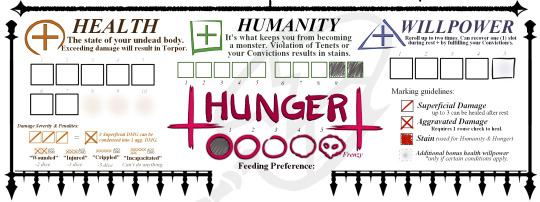
I've been making custom sheets for a Vampire: The Masquerade homebrew one-shot, and I really dig how the hunger bar turned out!!
I don't know if anyone would be interested in them, but I'll release the personalized versions I made per clan later when they're all done☆
#character sheet#vtm#vampire the masquerade#bloodlines#ttrpg#tabletop#vampire bloodlines#vampire masquerade#homebrew#vtm chronicle#character sheets#wod#worldofdarkness#brujah#tremere#ventrue#tzimisce#malkavian#toreador#lasombra#salubri#nosferatu#gangrel#thinblood#ravnos#banu haqim#f2u#f2u resources#vampire#free resources
18 notes
·
View notes
Note
hello! feel free to ignore me if this is slightly outside the boundaries of this account, but i'm a tabletop roleplaying game (ttrpg) designer looking for opinions on mechanics for disability in games.
my game specifically covers a lot of themes that, while not about disability, would make me feel remiss to not include some explicit mention of how physically/mentally disabled characters fit into the greater picture of the game. it has a specific focus on telling stories of diverse characters, for one, and on fighting the unfair capitalist systems that harm these marginalized groups.
my issue lies in how, exactly, to both treat this topic respectfully and make the characters not feel out of place or unbalanced. i've considered several options, and was curious to hear from a physically disabled perspective how to proceed (i am mentally ill & neurodivergent, but to my knowledge not physically disabled).
option one: mention that disabled characters of all kinds are encouraged, and talk about roleplaying them or provide resources for how to handle them respectfully, but don't apply any specific rules with hard mechanics or numbers to them. this option is least likely to be inadvertently misconstrued or written poorly on my part, but may make disability feel like a "flavour" side note.
option two: provide examples for some common disabilities on the mechanical effects (such as a low vision character rolling less dice on rolls to notice visual details) without any "counteracting" mechanics. this one gives mechanical weight to disability, so it feels less like an afterthought, but may discourage people from playing disabled characters as they would be more likely to fail than other characters.
option three: the above, but with mechanical incentives for roleplaying in a way that acknowledges the character's disability. a "benefit", but less "giving a blind character echolocation" and more "gain XP for showing your characters disability and any aids they use" (similar mechanics exist for following your character's goals/personality traits). this would make disabled characters be more on par mechanically with other characters, but i fear it may come across as... viewing disabled characters as not worth it without some sort of benefit, i suppose?
apologies for the long rambling message, but i'd love to hear which of these options (or another suggestion) you'd be happiest to see in a game written by someone who isn't physically disabled! this is far from the focus of my game, but it's still an important part of the greater theme that i'd love to be able to get right. thanks! (similarly, if there are any groups not covered in the "underrepresented but common disabilities" post from your FAQ that you'd want to see in a game, i'd also be happy to hear those!)
Hello!
First things first, thank you so much for thinking about this! This isn't something that most TTRGs consider and, as a massive nerd who plays DND, Pathfinder, and other tabletop games, this has always been a big pet peeve of mine since making a disabled character is always unnecessarily hard to do with the game mechanics and rarely works out well.
Most of the time, I have to talk to my GM about how to make it work in their game and, unfortunately, I'm often told they won't allow it because it's "too much trouble".
This is all just to say, I really love the idea here and the fact that you're actually thinking about these things and wanting to do well by them is great!
Now, taking a look at the options:
Option One
One of the unfortunate things that I see a lot is people that are too scared to get something wrong with representation (Or social justice on a broader scale) that they don't try to do it at all. With this current era of cancel culture and people's reactions to what they deem 'offensive', it's understandable to be a bit apprehensive but if you're approaching the subject from a place of respect and you're receptive to learning and improving, most people will appreciate the effort.
While this option does sidestep the main issue you've identified, I do think it sidesteps the attempt at making disability part of your game as well. You can encourage people to make disabled characters all you want but without any real content for them in the game, it won't do much.
If you do go with this option, I'd strongly suggest including some information on the culture of your world and how it relates to disability, both to provide more substance to the content and to give players a bit to go off of when making a disabled character.
Option Two
I like this option much more than the first one, though I do agree that it may discourage people from choosing to play a disabled character.
Within the game mechanics, I think it makes a lot of sense to have these kinds of effects but I would encourage you to include more variety with it. Disability isn't 'one size fits all' and two disabled people can have different needs, strengths, and experiences -- even if they have the exact same disability. Instead, I'd suggest going for a slightly different model that includes more choices.
For example, a character with low vision may:
- Roll lower on perception checks involving vision
or
- Have disadvantage with ranged weapons/attacks
or
- Have lower rolls/less success in dim lighting
Do you see where I'm going with this?
Having more options for how the character's disability affects them allows players to make a choice for how they want to play the character while also encouraging them to think more about how their character's disability might affect them and impact their life.
The examples given are all reflections of how blindness can affect somebody. Blind spots or blurry vision can make it more difficult to notice certain visual changes, severe nearsightedness can make it difficult to aim/focus on things that are far away, night blindness can make it difficult to see in the dark or in dim lighting, etc. That being said, there are dozens of other ways to go about this (Though I'd advise sticking to five options per disability at most to avoid overwhelming people).
Option Three
Personally, I like this one and the second option the most. Although I understand where your concerns are coming from, it feels less like it's implying that disabled characters have to be 'worth it' and more like it's just balancing it out.
Like with the second option, I'd suggest going for more of a choice model here where the player can pick what 'benefit' (For lack of better word) that their character has -- or even to choose no benefit at all.
Many physically disabled people develop our own skills or tools to compensate for where we struggle, whether this is an intentional decision or just something that happens.
For example, my boyfriend is paralyzed from the waist down and uses a wheelchair full time. As a result, he has kick-ass upper body strength from it.
Similarly, many deaf and hard of hearing people are more observant when it comes to visual cues and many blind people are more sensitive to other senses (Though, of course, the whole 'super senses' thing is a myth).
While this isn't true of all disabilities or all disabled people in general, it is something worth considering.
That being said, if you do decide to implement this option, make sure that the benefit makes sense for the disability or is related in some way and isn't just something random being tacked on -- that would make it seem more like a 'disabled characters need to be worthwhile' thing.
As a few extra notes:
If you go with the second or third option, I'd suggest separating the different stat effects into different types of disabilities. You don't need to go too into specifics with it but something like 'low vision/blindness/vision loss', 'deafness/hearing loss', 'limited mobility', and 'chronic illness' would work. While disabilities are more nuanced than this in real life, setting it up this way would keep it pretty simple and allow players to tweak the mechanics slightly for their own characters.
If you go with the first option, I'd probably avoid discussing how to roleplay disabled characters. Because roleplay and character development is much more open than stats and game mechanics are, showing one or two 'proper' ways to play a disabled character is more likely to reinforce stereotypes, dismiss certain experiences that disabled people have, or just come across as more of a 'lecture' than anything. The same goes for including information on what to avoid. I'd stick to providing information about your world and how disabilities are seen in them instead of giving instructions here.
I'd suggest including ways for players to bypass the mechanics of disability if they'd like to, even if their character is disabled. That would allow for a bit more freedom with how they portray their character and would also ensure that they aren't being 'penalized' (For lack of a better term) with their stats for playing a disabled character. As a bit of an example of what I mean: A character in DND could have been a criminal growing up without necessarily taking the Criminal/Spy background.
In general, I think as long as you're approaching this respectfully (Which you are!) and reaching out to physically disabled people for their input (Which you are!), you don't have to worry too much about misrepresenting it.
Cheers,
~ Mod Icarus
183 notes
·
View notes
Text
@starshinescribbles developed this incredible resource for ttrpg creators, and it’s too good not to share!
Pictures, sounds, fonts, frameworks, and no AI shit!
1K notes
·
View notes